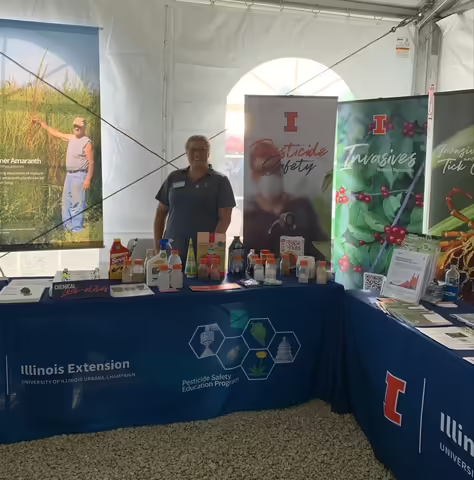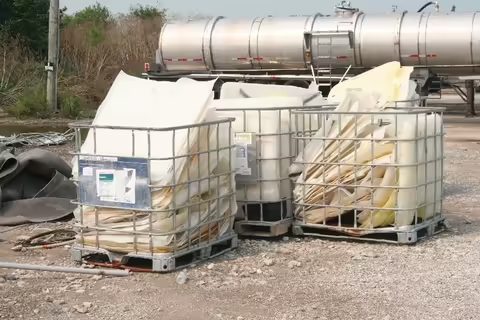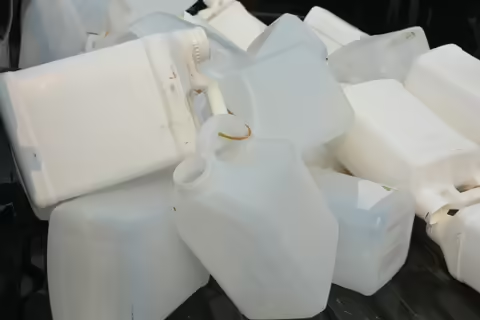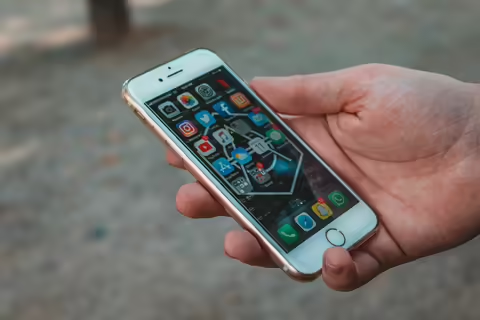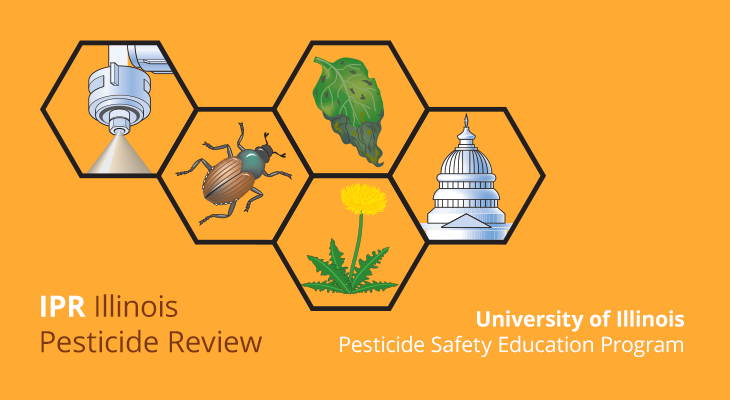
Farm Progress Show
The Pesticide Safety Education Program was represented at the Farm Progress show in Decatur this year with a booth on Pesticide Look-alikes. It was a great opportunity to share with the public the dangers of pesticides, especially those that are not kept in original containers. Because many of the pesticide incidents involve children 12 and under, we passed out “Mr.Yuk” stickers to put on containers at home that could be harmful to children. This will enable youth to have a visual aid to stop them from picking up harmful products. Many children can’t or won’t read a label and may wrongly assume a product is safe so a quick visual can help them. We also updated our pesticide look-alike fact sheet and handed out several. Many folks shared stories of youth accidentally ingesting pesticides because they were in the wrong container. The accidents that happened "close to home" left lasting impressions and changed significant behavior towards pesticides. We appreciate all these stories and opportunities to get out to speak with others. Should you need this information covered in a classroom or event, please feel free to reach out to the PSEP team.
We look forward to the next Farm Progress Show.
Household Hazardous Material Collection Events Scheduled for Fall 2021
Now is the time to get rid of any old or unwanted pesticides in your chemical storage area. The Illinois EPA one-day household hazardous waste collection schedule has been released to the public. Please note, all one-day collections require pre-registration. More information can be found below. Here are a few options you have for disposing of your old or unwanted pesticides:
- Use them up. You can usually apply them to a labeled-use site regardless of whether or not pests are present. Be sure to read and follow all label directions. Sometimes pesticides are taken off the market, or certain uses are removed from the label. In those cases, existing stocks can typically still be used. Rarely does US–EPA order a stop-use on the product. However, it is illegal to apply old stocks of chlordane or 2,4,5-T. To learn about the registration status of your product in question, you can contact the manufacturer or the Illinois Department of Agriculture, (217)785-2427.
- Give them away. Fellow neighboring gardeners may be interested in your castoffs. It's not recommended that you sell unwanted pesticides. To sell a pesticide legally, it must still be in the original packaging with the complete label. If the pesticide is restricted use, you must be licensed in order to sell it. If the product registration has been cancelled, selling is illegal.
- Take them to a hazardous waste collection event. The Illinois Environmental Protection Agency (IEPA) has scheduled a few one-day household hazardous waste (HHW) collection events to be held across Illinois this fall. See below for the schedule.
For a list of household hazardous waste materials that are acceptable or unacceptable at these collections, please visit the Illinois EPA's Web site at https://www2.illinois.gov/epa/topics/waste-management/waste-disposal/household-hazardous-waste/Pages/acceptable-wastes.aspx.
If in doubt, it may be best to first contact the Waste Reduction Unit of the IEPA at (217)524-3300.
There are special hazardous material collection events for other non-household types of pesticides:
- Agricultural pesticides are collected at various scheduled "Agricultural Pesticide Clean Sweep" events. Contact the Illinois Department of Agriculture, (217)785-2427, for more information.
- Structural pesticides (those used by professional applicators to control pests in and around structures) are collected at "Structural Pesticide Clean Sweep" sites. Contact the Illinois Department of Public Health, (217)782-4674, for more information.
One-day Collection Schedule
Please note that some dates and events have already passed and are therefore, not listed here.
|
October 9 |
|
October 9 |
|
October 16 |
|
October 23 |
All events require registration in advance. Please visit the links above or contact the event co-sponsor to pre-register or for additional questions.
One-day collections are open from 8 am to 3 pm on the above scheduled Saturdays. Please note these are open to all Illinois residents. In addition, the following long-term facilities are available for disposal of HHW. Please phone ahead to determine availability and open hours.
Long-Term Collection Locations
City of Chicago
Household Chemicals and Computer Recycling Facility
1150 N. North Branch on Goose Island
Tues: 7 am - noon
Thursday: 2 pm - 7 pm
First Saturday of each month: 8 am - 3 pm
For information: (312) 744-3060
Rockford:
Rock River Reclamation District
3333 Kishwaukee
Sat: 8 am - 4 pm
Sun: Noon - 4 pm
For information: (815) 987-5570
http://knib.org/recycling/green-guide/household-hazardous-waste-site/
Naperville:
Household Hazardous Waste Facility
156 Fort Hill Dr.
Sat: 9 am - 2 pm
Sun: 9 am - 2 pm
For information: (630) 420-6095
https://www.naperville.il.us/services/garbage-and-recycling/household-hazardous-waste-facility/
Lake County:
The Solid Waste Agency of Lake County (SWALCO) currently operates a long-term household chemical waste collection program. Information and a collection schedule can be found on the SWALCO Web site http://www.swalco.org or by calling (847) 336-9340.
For questions concerning the IEPA's one-day or long-term collections, please call the Waste Reduction Unit at (217) 524-3300.
2021 Ag Container Recycling Program
The Illinois Department of Agriculture coordinated 28 single day collections of HDPE #2 plastics at agri-chemical facilities throughout the state in 2021. These collection events were held in July and August. Plastic materials that were collected for recycling included small containers, 2.5-gallon containers, 5-gallon containers, mini bulksand drums ranging in size from 15-55 gallons. The events yielded 92,534 lbs. or 123,379 containers.
Since 1990, the Illinois Department of Agriculture has partnered with statewide agri-chemical facilities to collect 2,497,120 pounds of HDPE #2 plastic. The program collected 3,600 pounds in 1990. Collection events from 1995 through 2000 resulted in collections of over 100,000 pounds annually. Collection totals have been declining since 2001. In 2006 collection totals declined to a low of 40,475 pounds. Beginning in 2007 collection numbers have been increasing. In the last four years collections have rebounded to a range of 77,000 to 95,000 pounds.
If you missed any of the events across the state, the IDOA has established permanent collection sites that are open throughout the year. Permanent sites in Illinois are able to accept containers throughout the year. Before dropping off containers, please call to ensure the facility will be open.
|
County |
Location |
City |
Contact |
Phone # |
|
Pike |
Griggsville |
Logan Agri Srv, Inc. |
Josh Schaver |
217-833-2375 |
|
Lawrence |
Klein Flying Service |
Lawrenceville |
Robert Klein |
618-884-1040 |
|
White |
Carmi |
Klein Flying Service |
Bri Klein |
812-890-8605 |
Mini bulks must be cut up (cut off top and bottom, cut into 4 separate sides) before they can be recycled. All containers must be triple rinsed with labels, caps, foil seals and fittings removed before recycling.
Three Reasons Why You Should Let Your Phone Go to Voicemail While Working With Pesticides
Have you ever tracked how much time you spend using your smartphone? This past week, I averaged 1 hour and 54 minutes per day viewing email, browsing websites, and scrolling social media. The temptation of immediate access to information can be hard to resist. Whatever your opinion on smartphone usage may be, the following are three reasons why your phone shouldn’t be in your hand while mixing, loading, or applying pesticides.
Reason 1: Increased risk of exposure
Phones add yet another surface that can be contaminated with pesticide residues. There is always some degree of risk associated with using a pesticide. The risk of a pesticide is the probability of harm to a person that will result from its use. Risk is a combination of the pesticide’s toxicity (ability to poison) and the amount of exposure. If you are working with pesticides, you need to be diligent about avoiding exposure to pesticides and residues. Even a relatively non-toxic pesticide may present a significant risk if it is used carelessly or in a way that increases your exposure.
Pesticide labels include recommendations for specific personal protective equipment and actions to take to reduce potential exposure. It’s also common for labels to include a statement recommending that users should “Wash hands before eating, drinking, chewing gum, using tobacco, or using the toilet.” This recommendation targets oral exposure and dermal exposure. However, if you handled your phone while working with pesticides, it was likely contaminated. When you pick up your contaminated phone after washing your hands, you have a dermal exposure and the potential for oral exposure.
If you need to use your phone while working with pesticides, take these steps to avoid contaminating your phone. Wash your gloves with detergent and water before you remove them. This way, you will not contaminate your hands when you remove them. Then wash your hands with soap and water after you remove the gloves.
From my observations as a parent, small children love to grab their mom and dad’s phones. They see us glued to them, and they want in on the fun. Unfortunately, any pesticide residues on your phone have now transferred to your child’s hands, and it’s only a matter of time before they reach for their mouths. While the exposure may be small, children tend to be more sensitive, and small exposures repeated time can have harmful effects.
Reason 2: Distractions lead to mistakes
Phones pose an unnecessary distraction that may lead to application errors. Fred Whitford, Purdue Pesticide Program Coordinator, produced an excellent publication and corresponding presentation titled Measuring Pesticides: Overlooked Steps to Getting the Correct Rate. Within these resources, Whitford advises applicators and handlers not to answer phones or talk to people and encourages applicators to keep distractions to a minimum when mixing products. It is too easy to lose track of or forget what you have or have not put in the tank. Measurement errors can be costly, both in terms of lost product and poor pest control.
Reason 3: It’s probably a telemarketer
The majority of calls to my cell phone are unwanted spam. I doubt that I am the only person to ignore calls from unknown numbers. If your phone rings while you are mixing or applying pesticides, let it go to voicemail. Chances are it’s Rachel from Cardholder Services or that kind individual that has trying to reach you about your car’s extended warranty. If the call is truly important, they will likely leave a voicemail. You can call back after you have finished the job. If the caller was a client or your boss, surely hopefully will appreciate your safety and accuracy.
While you shouldn’t use your phone while working with pesticides, you should keep it nearby in the event of an emergency. The ability to call for help can have immediate lifesaving benefits.
PSEP Clinics on Hold for This Season
We have come a long way from where we were this time last year in our battle against Covid-19. Unfortunately, we find ourselves still not out of the woods yet. We had truly hoped to return to in-person training clinics this fall, but we had to make the extremely difficult decision to pause our in-person clinics for the time being. So, as a result, the University of Illinois’ Pesticide Safety Education Program (PSEP) will not offer in-person training during fall 2021 or spring 2022. This determination was made carefully with consultation by all major parties involved. We are hopeful that the Covid-19 situation will improve with time, thus allowing us to safely and efficiently return to large, well-attended, in-person training. We certainly miss talking with and serving our pesticide applicators in person.
In the meantime, all training will be available online only. Illinois PSEP created new training courses for General Standards and most of the applicator categories in 2020 based on our in-person presentations. Users appreciated that the material could be accessed any time of day with repeat viewing if needed. Knowledge check questions are sprinkled throughout each course to help ensure retention of the material. All training modules are currently undergoing needed maintenance but will be available again soon. Until then, manuals and workbooks are available for self-study. Please check our website for more specifics. Additionally, look forward to the November/December issue of this newsletter for even more information.
Illinois Department of Agriculture introduced online testing for pesticide licensing last year. The online testing option will continue for the 2021-2022 season. Additionally, the Illinois Department of Agriculture will be hosting some in-person testing opportunities. They are currently working on that schedule. Those applicators who are up for retest will receive more information in the mail within the next few months.
Please let us know how we can assist with your pesticide safety education needs. We look forward to serving you, and we greatly appreciate your willingness to pivot accordingly during these unprecedented times. Have a safe and healthy application season.
Download This Issue of the Newsletter
Download, save, and share the 2021 September/October issue of the newsletter.
Editorial Notes
The development and publication of this newsletter has been supported with funding from the Illinois Department of Agriculture.
Michelle Wiesbrook, Extension Specialist, Pesticide Safety Education
The Illinois Pesticide Review is published six times a year. For more information about pesticide safety or for more issues of this newsletter, please visit us at www.pesticidesafety.illinois.edu. You can also reach us at 800-644-2123.
Disclaimer: Mention of trade names in this newsletter is for general information purposes only and does not constitute endorsement of one product over another, nor is discrimination intended against any product.
Copyright © 2021, Board of Trustees, University of Illinois
Find Us On Social Media
We’re on Facebook! Follow our University of Illinois Extension Pesticide Safety Education (PSEP) page for updates on programs, news, and events.
